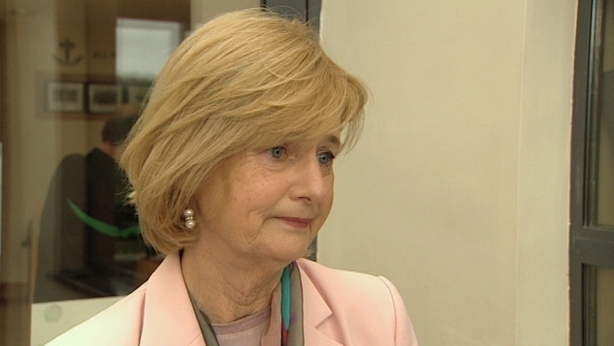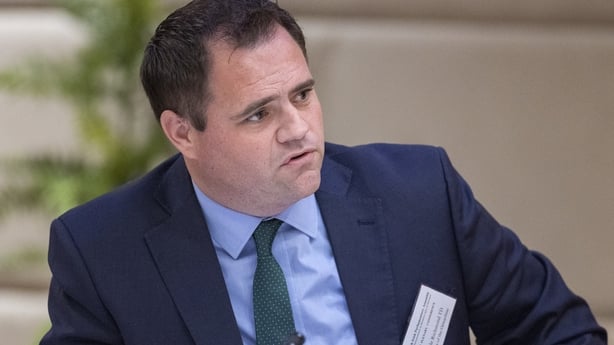The party is over twelve years in Government, in possession of the Taoiseach's office again and many of its members have hopes of a further term.
However, after such a long spell in power and with the party refusing to contemplate a coalition with Sinn Féin in the future, some are asking if the party may be better off returning to the opposition benches to focus on building its support among the public.
This weekend, over 700 Fine Gael members will gather in Maynooth, for its "Special Conference", focusing on a number of themes including safer communities, farming and rural Ireland.
It will not be a full Ard Fheis, with the usual big crescendo at the end in the form of the leaders speech. Instead Fine Gael will hold its Ard Fheis next April. Saturday's conference however is said to be fully subscribed according to organisers.
No doubt it will be an opportunity to test the party mood in the months before the local and European elections, with some fearing they could be difficult for the party.
"There will be panic if there's a bad local", one rural TD warns.
The party intends on running approximately 350 candidates, so far around 70% have been selected. 30% of them are women.
There's a feeling of inevitability that Sinn Féin will make gains in the local and European elections, after such a bruising performance in 2019.
If Sinn Féin does make gains many fear that it will come at the expense of the coalition parties of Fine Gael, Fianna Fáil and the Green Party.
Some Fine Gael councillors are worried that they could face the wrath of voters, not because of a dissatisfaction with the performance of councillors necessarily, but because voters see it as an opportunity to express their dissatisfaction with the Government.
Leo Varadkar's position as party leader seems relatively secure at present, but one TD warns, "if we have a disastrous local election, Leo better watch out".
Capturing the true mood of Fine Gael is difficult, with a mixture of both optimism and pessimism among its representatives. Several TDs have announced that they will not contest the next election, they are Richard Bruton, Charlie Flanagan, Brendan Griffin, John Paul Phelan, Michael Creed, Joe McHugh and David Stanton. More are expected to follow.
Two MEPs, Frances Fitzgerald and Deirdre Clune, have also announced their intention not to run.

Some might argue that it's an exodus fueled by a feeling that the party is destined for the opposition benches.
However many others dismiss such theories. The party has lost big names before previous elections, such as Michael Noonan, Enda Kenny and others in 2020. In most cases seats were retained.
"The real opportunity is that those places have three, four and in some cases five people looking to be the new Frances Fitzgerald... the new Charlie Flanagan", Senator and former Social Protection Minister Regina Doherty says.
Her optimism is shared by others, who believe a new generation could be a good thing.
It provides another opportunity too, according to Dr Kevin Cunningham, lecturer in politics at Technological University Dublin.
He explains that the next general election will be unique, because parties will be required to ensure that 40% of their candidates are women.
"The two parties Fianna Fáil and Fine Gael are probably going to struggle to make that figure and for Fine Gael at least, losing some of these male TDs will give them more capacity to blood [run] new female candidates into safe seats as well", he says.
Parties that do not meet these quotas will lose 50% their state funding.
The timing of the next General Election is another topic being discussed among politicians in the party.
The coalition leaders have indicated that they want to see the Government run its full term to March 2025. Many believe an election could easily happen at some point next year.
Whenever it may be, Fianna Fáil and Fine Gael will have to have an "amicable breakup, if they have any hope of ensuring the coalition is re-elected", according to one Cabinet Minister.
There will be no formal transfer deal between the coalition parties, but there's an expectation that both Fianna Fáil and Fine Gael will be transfer friendly.
That General Election will come after three terms of a Fine Gael Government.
Minister of State Neale Richmond argues that the party has a lot of to be proud of.

"Look at the record, absolutely loads of challenges but when we came into Government the country was on its knees....
We've managed to turn the country around, we've faced serious global crisis, be it Brexit, the financial crash, the war in Ukraine, a global pandemic the likes of which we haven't seen in a century and we've driven the country, the economy and society through that", he says.
Of course one crisis that Fine Gael cannot claim to have solved is that of housing, something that could have a big impact on the next election. However it argues that the tide is turning.
Neale Richmond insists that the party is in an "upbeat mood" with many new candidates injecting a new energy into Fine Gael.
In the immediate aftermath of Election 2020, Leo Varadkar said that his party would be going into opposition, insisting that he would "relish the challenge" of scrutinising the Government. Ultimately, he would find himself back in power.
Now, he's seeking another term as Taoiseach, hoping the current coalition can be re-elected with some possible additions.
While a term on the opposition benches might bolster Fine Gael support, there appears to be limited appetite for it among TDs.
"A spell in Government would do us a lot of good, but I don't want a Sinn Féin Government" says one former Fine Gael Minister.
In fact the objective of many in the party is to maintain a hold of the levers of power.
As former Tánaiste Mary Harney once said, "your worst day in Government is better than your best in opposition".
It's a mindset that appears to be driving many in the Fine Gael party to strive for another term in the corridors of power.







